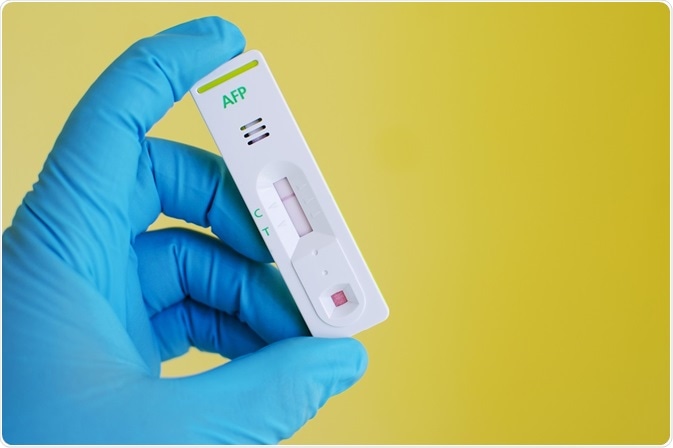Many imaging and serologic tests have been evolved to help predict the occurrence of congenital disease. One such test is the maternal serum alpha-fetoprotein screening test (MS-AFP).
 Image Credit: Jarun Ontakrai/Shutterstock.com
Image Credit: Jarun Ontakrai/Shutterstock.com
Indications
The MS-AFP test is a routinely offered screening test for all antenatal women because it is both efficient and cost-effective as a method of predicting the risk of neural tube defects in the baby. In addition, it also provides information on the risk of other birth defects and pregnancy complications. It thus forms part of the triple and quadruple test which are screening tests for fetal anomalies.
Some high-risk conditions in which the MS-AFP test is ordered include:
- Older mothers
- History of babies with congenital defects
- Family history of babies with congenital defects
Alpha-fetoprotein (AFP) testing outside pregnancy is required in situations such as:
- Screening for certain cancers arising from the germ cells (liver, ovarian or testicular)
- Monitoring cancer treatment efficacy by measuring the decline of AFP levels
What is alpha-fetoprotein?
AFP is a glycoprotein found in the plasma of pregnant women, produced by the fetal tissues, specifically the yolk sac and the fetal liver. It is encoded by chromosome 4 in tandem with the albumin gene and the protein is probably the counterpart of serum albumin in fetal life. It exists as monomers and dimers, as well as trimers. It is the most abundant serum protein in the early embryo.
AFP passes from the fetal circulation into the fetal kidneys to be excreted into the amniotic fluid. Open defects of the neural tube cause excessive amounts to leak from the fetal blood into the amniotic fluid because the two are now in direct contact due to the defective body wall at the site of the anomaly.
The AFP level is known to rise from the end of the first trimester, lies between 10-150 ng/mL thereafter, and falls only after 32 weeks of pregnancy. The mean level is somewhat higher in blacks, on average, and lower in Asians than the level in whites. It also varies with body mass.
The normal level in non-pregnant adults falls between 0 to 40 ng/mL, and levels above 200 ng/mL in individuals with hepatic cirrhosis are highly suspicious of superadded hepatocellular carcinoma.
Procedure
The test is performed on maternal serum, using venous blood. Another test, called urinary alpha-fetoprotein, is done using urine samples, as well as amniotic alpha-fetoprotein levels using amniocentesis, after 15 weeks of pregnancy. Leakage of AFP through the urine in neural tube defects raises the amniotic fluid levels, which in turn is used to diagnose these conditions.
Abnormalities in alpha-fetoprotein levels
Elevated MS-AFP levels are found in:
- A baby who is older than expected by the pregnancy dates, usually because of improper dating
- Neural tube defects such as anencephaly, meningocele, or spina bifida
- Gastrointestinal defects such as gastroschisis or omphalocele
Low MS-AFP levels are found in Down syndrome (trisomy 21).
High AFP levels in adults who are non-pregnant may occur in:
- Hepatocellular cancer
- Metastatic liver cancer
- Liver cirrhosis
- Germ cell tumors
- Yolk sac tumors
- Hepatitis
- Ataxia telangiectasia
Falsely high levels may be found in:
- Recent use (within 2 weeks) of radioactive tracers
- Multiple gestation
- Gestational diabetes
- Smoking
MS-AFP testing is a relatively safe procedure, with minor complications only, including bruising at the site of venipuncture, worse in those with coagulation disorders or on blood thinning agents. If amniocentesis is performed, there is a small risk of miscarriage (<1%) and preterm delivery.

0Comments